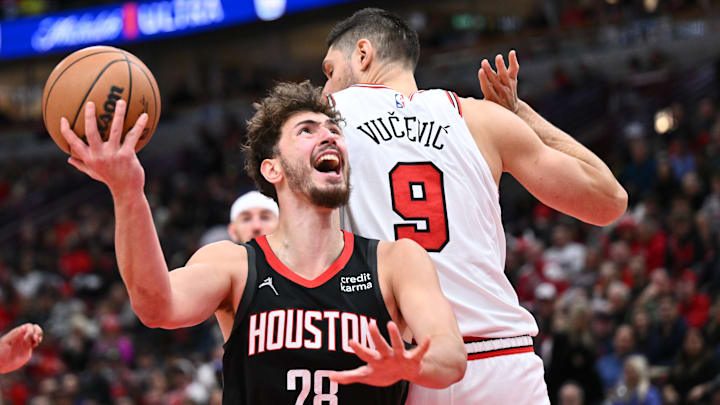We've all been wrong before. Even the most devout Houston Rockets writer could misunderstand a situation involving the team.
(Hint, hint).
Our understanding was that Alperen Sengun was unlikely to receive an extension this summer. It seemed sensible that the Rockets would preserve his much smaller cap hold for next summer instead.
Now, Jonathan Feigen of the Houston Chronicle is reporting that Sengun and the organization are nearing an agreement.
Rockets may lock up young star
This is a surprising turn of events. Most of Sengun's 2021 draft classmates have received their money. Teammate Jalen Green is also without an extension, but that's no surprise. Given Green's inconsistent play, his own management may be advising him to prove his worth in 2024-25.
Sengun's situation is different. He's proven himself. By any measure, he should be receiving the same money that Scottie Barnes, Cade Cunningham, Evan Mobley and Franz Wagner have received. That's why it stood to reason that the Rockets were preserving the cap hold.
What's the thinking here?
Sengun may prefer security
If Sengun is going to receive an extension this summer, we'd have to assume it will be for less than the max. Otherwise, the Rockets have little incentive to offer him a deal now.
So, it may be that Sengun is favoring long-term security over a (presumably) higher amount. If that's true, the question becomes:
How far below the max is the deal?
Let's use Cunningham as an example. His deal is worth roughly $45 million annually. Sengun has been at least equally productive, and his production has resulted in more team success. His agents should be making the case that Sengun deserves Cunningham money.
Yet, the Rockets would be needlessly forgoing Sengun's cap hold by giving him that money. If they're extending him now, it's surely because they're getting a discount. Thus, we get back to the question: how far below $45 million could the deal be?
If it's $40 million a year, the Rockets may do better to continue waiting. That $5 million a year will have minimal utility in working around the cap on an annual basis.
If it's $30 million a year, we can't imagine what Sengun and his people are thinking. The Rockets would have to pounce on that opportunity, but why would Sengun agree to it? Surely he's not so eager to preserve his future that he'd radically shortchange it in the process.
We can't wait to find out. It's possible that the Rockets have decided to devalue that cap hold - the upcoming free agency class doesn't have an obvious target for this organization.
Yes, the Rockets could have traded into their cap space, but there's no guarantee that the right guy becomes available. At the right price, it could be more logical to preserve Sengun now at the cost of an offseason move that may not happen:
Even if we didn't see it coming.
